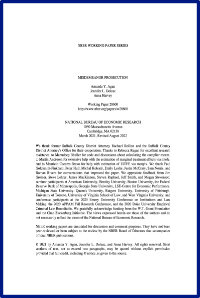Misdemeanor Prosecution
Amanda Y. Agan, Jennifer L. Doleac & Anna Harvey
Communities across the United States are reconsidering the public safety benefits of prosecuting nonviolent misdemeanor offenses, yet there is little empirical evidence to inform policy in this area. In this paper we report the first estimates of the causal effects of misdemeanor prosecution on defendants' subsequent criminal justice involvement. We leverage the as-if random assignment of nonviolent misdemeanor cases to Assistant District Attorneys (ADAs) who decide whether a case should be prosecuted in the Suffolk County District Attorney's Office in Massachusetts. These ADAs vary in the average leniency of their prosecution decisions. We find that, for the marginal defendant, non-prosecution of a nonviolent misdemeanor offense leads to a 53% reduction in the likelihood of a new criminal complaint, and to a 60% reduction in the number of new criminal complaints, over the next two years. These local average treatment effects are largest for defendants without prior criminal records, suggesting that averting criminal record acquisition is an important mechanism driving our findings. We also present evidence that a recent policy change in Suffolk County imposing a presumption of nonprosecution for nonviolent misdemeanor offenses had similar beneficial effects, decreasing the likelihood of subsequent criminal justice involvement
Cambridge, MA: National Bureau of Economic Research, 2022. 103p.


